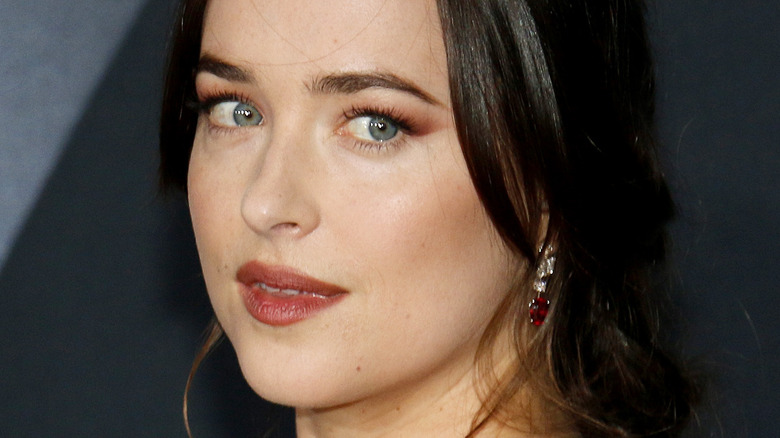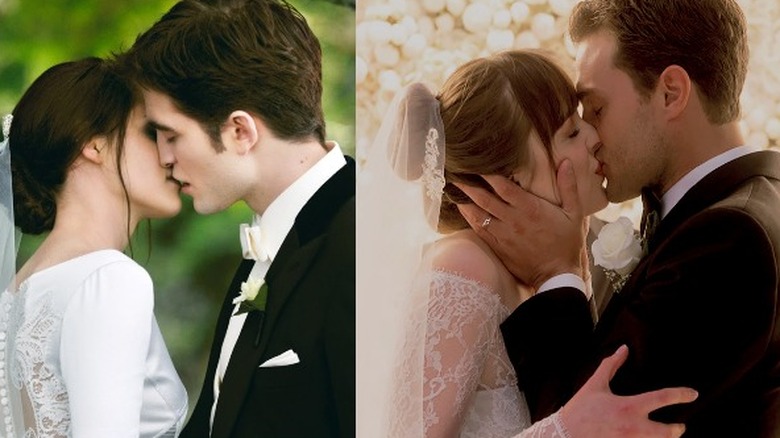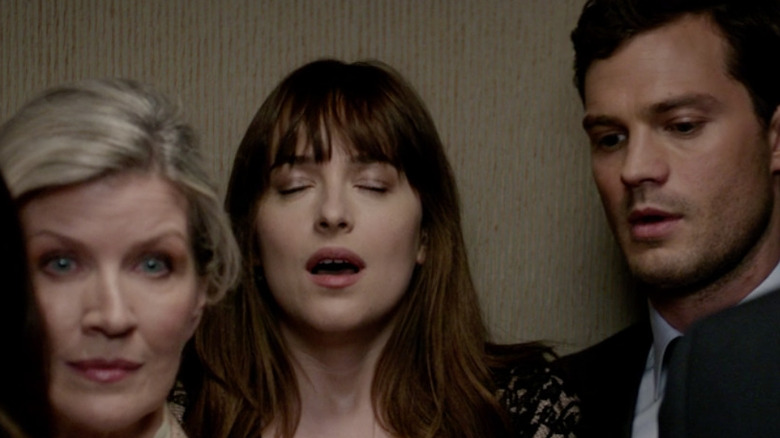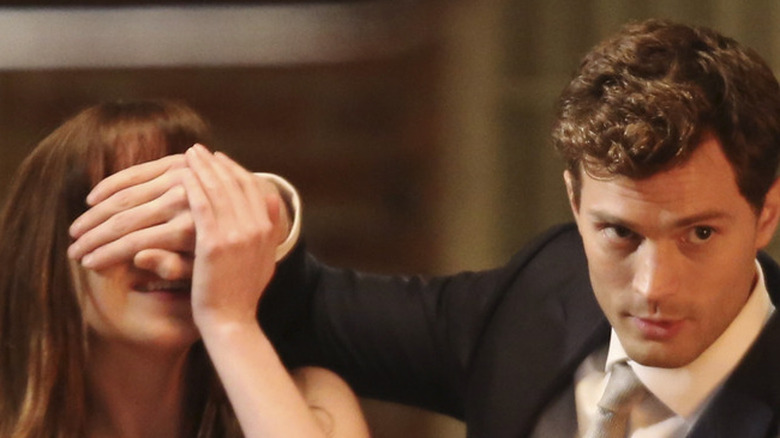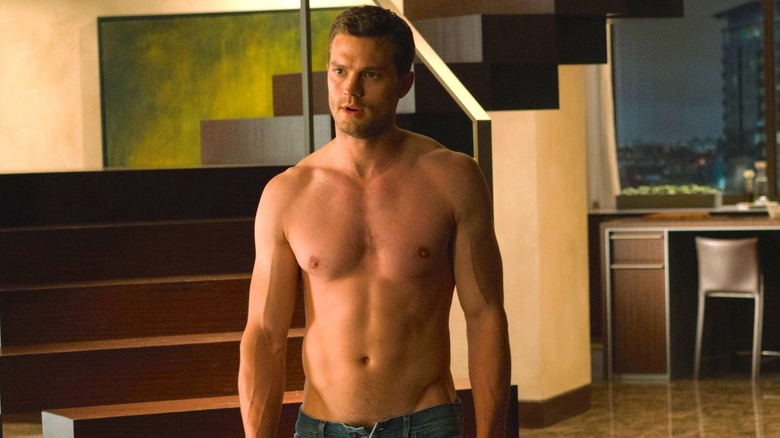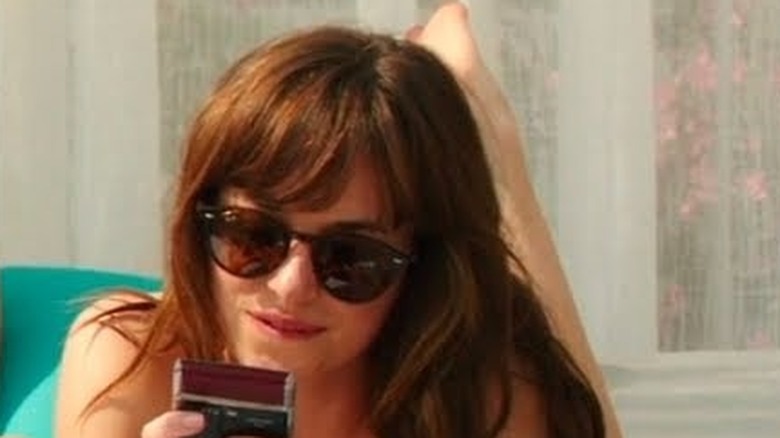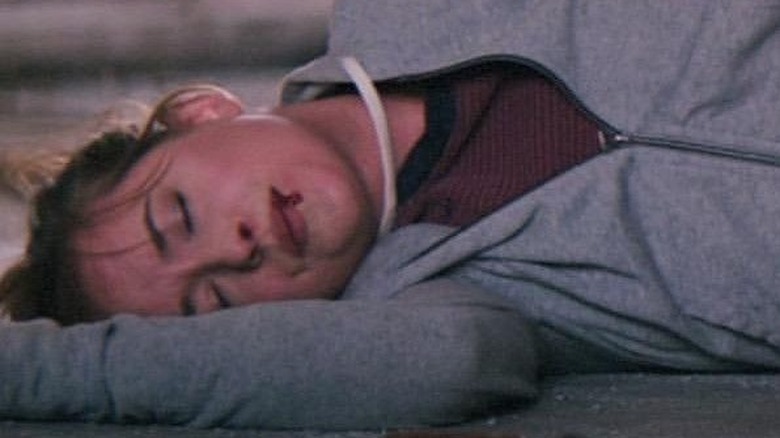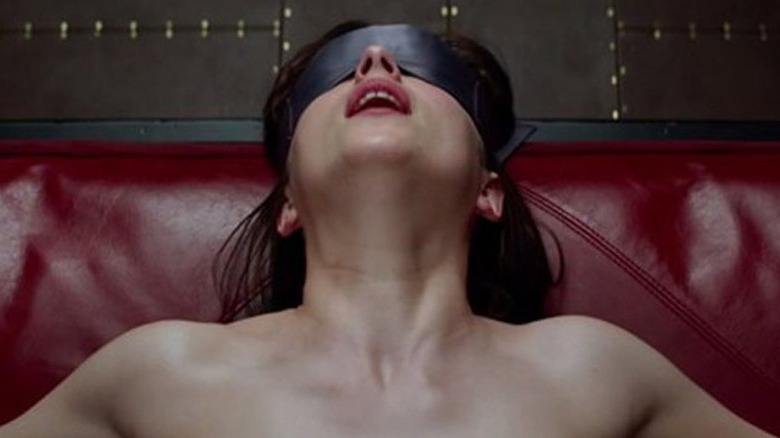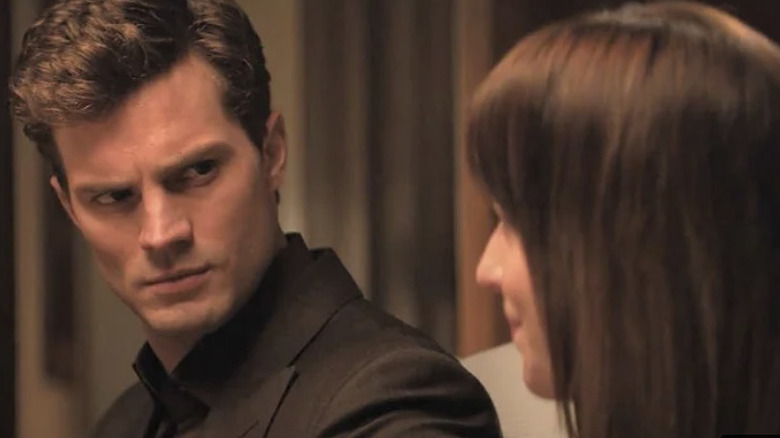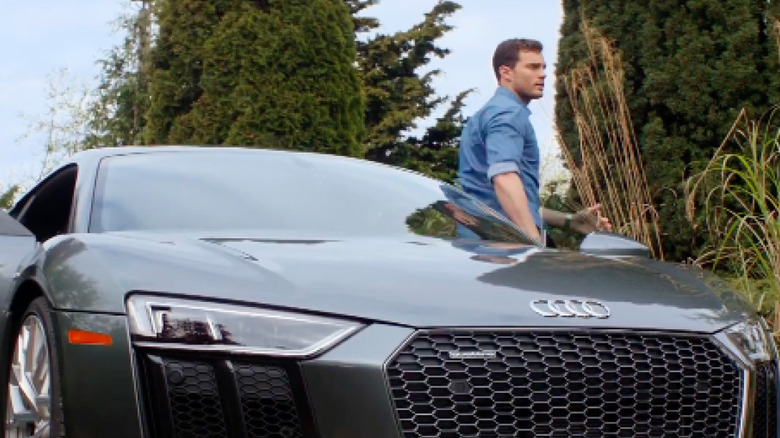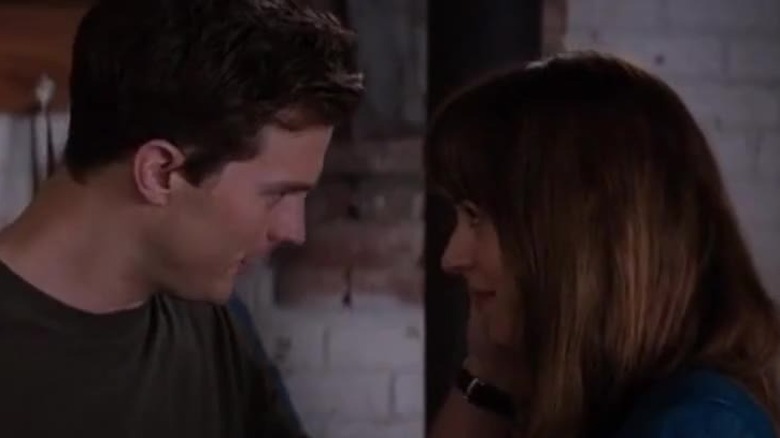Things That Happen In Every Fifty Shades Of Grey Movie
There's refuge in the familiar. There's reassurance in the reliable. There's security in the consistent. The same way we gravitate to comfort foods, do we gravitate to the faithfulness of a story archetype. These are the stories that follow an unswerving narrative arc — be it that of the hero's quest or the unlikely romance or the steadfast structure of a "Law & Order" episode — and in doing so bring order and a feeling of safety in an out-of-control world full of chaos.
Some frequently condemn these stories as predictable, when in fact that is often the precise reason they are so successful and beloved. With three movies that cumulatively brought in over $1.3 billion worldwide, The "Fifty Shades" franchise is one such set of stories, following the same tried-and-true formula of a standard romance, with a lot of kinky sex -– or at least an allusion to it — thrown in, and they all connect to and reflect one another. Let's take a look at some things you can find in every film of the "Fifty Shades of Grey" trilogy.
Obvious references to Twilight
It was never a secret that the original "Fifty Shades of Grey" novel was born out of "Twilight" fan fiction, and even casual observers can see the numerous parallels between the franchises. Besides both being set in the Pacific Northwest, they both revolve around an unnaturally gorgeous, enigmatic and withdrawn man and an insecure, clumsy, virginal brunette who's really into books. The man doesn't understand boundaries, and the woman doesn't understand basic human interaction. The man has access to seemingly unlimited funds, while the woman's finances are probably best described as "generic middle class suburban" in that she drives an old car, can't just replace high-ticket items, and has to use airline deals to fly cross country, but is in no way actually struggling to get by. Both couples will be threatened by malcontents. Both men will struggle with inner demons.
Almost the entirety of the "Twilight" franchise is about the denial of physical intimacy — sex as well as the intimacy of Edward turning Bella –- while the "Fifty Shades" franchise simply takes the implied and makes it overt. There's even the negotiation of their physical relationships, though "Fifty Shades of Grey" is predictably racier. Additionally, both Ana in "Fifty Shades Freed" and Bella in "Breaking Dawn Part 1" will fight to have their babies against a disapproving, disillusioned, and flat-out angry Christian and Edward, respectively. The lists go on and on. The "Fifty Shades" movies are an obvious homage to their roots.
Escalating incidences of public displays of, um, affection
When Christian Grey meets Anastasia Steele in "Fifty Shades of Grey," she's a virgin whose interest in Christian is obvious. Their first physical encounter, therefore, is a tantalizing appetizer meant to whet the appetite for what's to come — especially since it previews the many instances of public petting that'll go down throughout the series. This moment occurs in an elevator in a rush of passion that overtakes them and makes Christian forget all about that pesky paperwork. It's just a kiss, but what a kiss it is, and the state of Ana's hair alone makes it clear what they were doing in this public space.
In "Fifty Shades Darker," everything has been amped up, and that includes the sex. Ana and Christian are much more willing to engage in a little public play with a certain gift hidden away at the masquerade ball. The two later spice up a dinner date with some under-the-table tricks that, again, give way to some super-PDA in the elevator. Finally, "Fifty Shades Freed" brings the public sex to its peak in the passenger seat of Christian's car, parked in a public lot in broad daylight, after the supposedly erotic thrill of almost being killed in a high speed car chase. This time it's Christian who's uncomfortable with their obvious visibility, but Ana is beyond caring.
Ana has a hard time adjusting
The virginal romantic heroine is a trope so outdated it's come all the way back around to fashionable and then outdated again. Virginity in romance is never just about someone never having had sex, though, but an innocence in the world. To that end, Anastasia Steele is a paragon. Well beyond not knowing what a butt plug is, Ana is regularly confused by the life she's stepped into. In the first film, it's understandable to an extent. You don't expect a man you've just met to buy you a new computer, much less a car. However, Ana's also has no ability to talk in front of an attractive man, because her initial meeting with Christian reduced her to a puddle of goo, so flustered that a simple list of questions completely throws her off-kilter.
By "Fifty Shades Darker" this has lessened, but only slightly. She is wide-eyed, curious, and more than a little confused, by just about everything she encounters, in and out of the playroom. She can't imagine the purpose of the Ben Wa balls, for example, even after learning where they go. Further, it doesn't click that a man with what she assumes are burn scars on his chest now has a phobia around being touched in that area, and harangues him about it constantly.
In the final film, Anastasia is a force in publishing, allegedly, and a confident Mrs. Grey, but that doesn't mean she understands anything about her life, to say nothing of the dangers of a violent stalker. Despite engaging in a harrowing high-speed car chase and having a knife at her throat, Ana eludes her security detail. She ignores convenient opportunities to inform her extremely capable and resourceful husband of the predicament and idiotically goes after evil Jack Hyde by herself. How can one person be so clueless?
Christian doesn't respect boundaries
There are arrogant, entitled, overreaching men, and then there's Christian Grey, leaving them all behind. It's unlikely he just so happens to know exactly where Ana is at all times. Whatever the situation, you can almost surely bet Christian is handling it in the least socially acceptable way. There are the obvious, overtly controlling aspects of his personality, trying to dictate Ana's diet, schedule, medical care, and sleeping arrangements, but there are also many ways he flouts basic courtesy.
For example, in the first film, he intervenes when José aggressively pressures Ana for a kiss that she resists. This is a positive behavior, but he follows it up by taking her to his hotel instead of her apartment, changing her into pajamas while she's unconscious, sleeping next to her, and berating her the next morning for her alcohol consumption. This is not acceptable in any conceivable way.
In the second, Christian treats Ana to a makeover experience ahead of his parents' masquerade ball that evening. This is very thoughtful, and appropriate, considering he wants her to attend an event that requires a certain dress code that Ana can't meet on her own. Unfortunately, he sets it up at a salon owned by Elena (Kim Basinger), a woman who took advantage of him when he was a child and called it seduction. This is creepy and awful, and Ana is rightly horrified.
In film three, Christian is scared at the prospect of becoming a father, which is a totally common, normal reaction. However, he proceeds in the worst possible way, scolding Ana for missing her contraception appointments, throwing a tantrum over how this ruins all his luxe life plans, and running to his abuser. His refusal to be respectful to others is thus a cringeworthy commonality of the films.
If you or someone you know is dealing with domestic abuse, you can call the National Domestic Violence Hotline at 1−800−799−7233. You can also find more information, resources, and support at their website.
If you or someone you know may be the victim of child abuse, please contact the Childhelp National Child Abuse Hotline at 1-800-4-A-Child (1-800-422-4453) or contact their live chat services.
So much lip biting
Honestly, it's a wonder Ana doesn't have the most chapped lips in the Seattle-Tacoma metropolitan areas. At what feels like every turn, every dirty thought, every proposition, every confusing moment, and every touch of insecurity, Anastasia Steele is biting her lip in "Fifty Shades of Grey." It even becomes an aphrodisiac for Christian, as he can't stop thinking about biting it himself.
With a new (male) director, "Fifty Shades Darker" loses a bit of its female gaze, sadly, but while the lip biting may subside, it still very much exists, with even Christian getting in on the action, and actress Dakota Johnson needing a special lip color application specifically for kissing scenes. Most lipstick disappears after a single cup of coffee, so one can understand the danger Ana is in of losing hers.
In "Fifty Shades Freed," poor Anastasia's lip is under assault once more, from moments of anxiety and marital concern to moments of aroused reminiscing. Maybe Mr. Grey's investment portfolio includes a hefty share of Chapstick stock.
Physical peril
It's demanding to have Taylor's job as Christian Grey's driver/bodyguard/errand boy. Whether it's escorting him all across the world, selling cars, buying clothes, restraining perpetrators, running plates, or digitally tracking moving targets, the poor guy never gets a day off. But who can risk letting the man take even a potty break when the lives of Christian and his lady Anastasia are in constant, mortal danger? After the couple meet in the first movie, Taylor's introduced as simply a driver, but it soon becomes clear he's a lot more than that: By the end of the film, Taylor alerts Christian to a "problem" at home, as his former submissive breaks in and causes trouble.
Things only get wilder from here. In "Fifty Shades Darker," the woman is back to watch Ana sleep a few times and vandalize her car before ultimately pulling a gun on her. But that's not all! Ana thwarts an assault by her boss, who decides to make destroying Christian the center of his vision board. Lastly, Christian's helicopter crashes and Ana has to contemplate life without him before he stumbles back home, filthy and confused as to why his whole family is there.
With "Fifty Shades Freed," the inevitable deadly situation with Jack comes to blows a total of three times. First there is a malicious car chase with Jack's victim/accomplice Liz; then Jack breaks into their penthouse and holds a knife to Ana's neck in a kidnapping attempt that is foiled only because he doesn't anticipate the second guard; and finally, Jack kidnaps Christian's sister Mia (Rita Ora), slaps and kicks Ana when she shows up to pay the ransom, and is shot in the leg by her before she passes out, precariously hanging onto her life and her budding pregnancy. Parenting is going to seem downright boring after all this death-defying.
An egregious misrepresentation of BDSM
BDSM is an overlapping abbreviation referring to bondage and discipline (BD), dominance and submission (DS), and sado-masochism (SM), all recognized and accepted kinks of the fetish community. In the "Fifty Shades" trilogy, Christian Grey claims to be a dominant in need of a submissive, and while his latest conquest Anastasia Steele definitely enjoys some of the sexual play they engage in, she regularly battles against Christian when he ventures more into deliberately cruel punishment and outsized controlling behavior. Now, she should absolutely object to those behaviors because that's not what BDSM is, and the trilogy never seems to understand that.
First and foremost, this kink is meant to please both parties. It should never be one-sided, as it frequently is between Ana and Christian, and she fails to use any of the safe words regardless of her growing discomfort. There's also an element of disdain to Ana's opinion of the roles. She is disgusted, for example, when she sees him interact with former submissive Leila, as the two both slide back to their prior roles without pause. For his part, Christian isn't much better, often speaking of his predilection as a sickness, an aspect of his psyche that is broken, and the story supports this narrative with Christian "confessing" to actually being a sadist when what he's really describing is a straight up misogyny.
The irony, of course, is that for all the talk of the Red Room and its numerous implements on display, the sex in all three movies is often tame and often a basic missionary style. In not-so-subtle imagery, the movie implies imaginative positions and toys are for meaningless bedroom encounters, whereas true love is made face to face. There's no denying that the franchise has been very good for the sex lives of couples everywhere, but it also sends a deleterious message about maintaining an intolerance of –- or at least the need to compartmentalize –- fetishes and "otherness."
If you or anyone you know has been a victim of sexual assault, help is available. Visit the Rape, Abuse & Incest National Network website or contact RAINN's National Helpline at 1-800-656-HOPE (4673).
Overactive jealousy
Jealousy is obviously in Christian's wheelhouse. He's arrogant, entitled, and used to getting what he wants. It's not an exaggeration to say he treats her like one of his possessions, fully intending and expecting her to act as he dictates and behave according to his rules. As he frequently says, Ana is his. Before they're even intimate, Christian is possessive and proprietary. He is jealous of every man Ana knows and gifts her with items that will ultimately benefit him. Not only is Christian wary of Ana's close friendship with José, who does cross boundaries later, but he also sees a threat in Paul, the innocuous store clerk with his three and a half lines. He's even upset she's going to Georgia unsupervised.
In the sequels, Christian's jealousy focuses primarily on Jack Hyde, Ana's boss. While Jack does turn out to be a creep, it's still no excuse for Christian to say the words "he wants what's mine" immediately after their initial meeting. Christian even gets jealous of his unborn child in the final film, saying the infant might steal Ana from him.
The jealousy of the "Fifty Shades" trilogy doesn't stop with the men, though; Ana also exhibits the trait. Granted, the objects of her discomfort -– his past relationships with Elena, Leila (and by extension other subs), as well as the advances of architect Gia Mateo –- regard people who have attempted to come between the couple, and Ana is simply reacting to that. Still, the green monster runs so rampant throughout the series, the cinematography should've been tinted cerulean instead of icy blue.
Ostentatious displays of wealth and privilege
Romance is its own genre, but it is also, and has always been, fantasy. The unicorns and wood nymphs and alien warlords may be supplanted by men who are instinctively good at love, but the escapism sought is the same. Within fantasy, the worlds are literally built from scratch, while in romance it's the ideas that are fantastical wish-fulfillment, even if the setting is supposedly based in reality. Real world romantic relationships are hard, whether you're maintaining a marriage, on the dating scene, or have given up entirely –- and that's before you factor in all the other drags on your emotions and energy, like bills and jobs and unruly relatives. Genre romances sweep all those things off the table like a ravenous lover, and the "Fifty Shades" trilogy sweeps with the promise of outrageous wealth.
Christian is ridiculously rich, having the means to do whatever and go wherever he wants, and to gift that ability to Ana as well. Not only does he sell her car and buy her a new one without her input, but he gives her the $24,000 from the sale and she, well aware she no longer needs that kind of money for any savings or future crisis, bids it all away at his parents' charity auction -– another event of the inordinately privileged. When Ana's boss poses a real problem, Christian buys the company. The last time he went shopping was when he bought an airline. He also purchases an entire house because Ana liked it one time they were sailing past.
Ana and Christian have problems, but their problems are never mundane or soul-crushing, like trying to live paycheck to paycheck. Christian probably doesn't even know what his electric bill is, and that is a luxury millions of fans would give anything for. It's the ultimate fantasy.
Laters, baby
It's almost possible to hear the wheels turning in the head of "Fifty Shades of Grey" author E. L. James, insistent that all endearing, successful, (fictional) pop culture couples need a pithy catchphrase and trying to come up with the perfect one. Somehow, "Laters, baby" is born. It originates early in the first film with Christian's brother Elliot saying it in earnest to Ana's roommate Kate, with whom he's just spent the night. Elliot is meant to be characterized as something of a flake who Christian thinks takes nothing seriously, so when he then repeats the phrase to Ana it's clearly supposed to be mocking.
The problem is there's not enough Elliot in the film to show him saying ridiculous things and/or being a flighty guy all the time. Christian's words, then, become sincere rather than ironic, and the phrase becomes inescapable. There was a podcast, there is merch, and there is a "Laters, baby" said with a smirk in every subsequent film in the trilogy. It's cheesy, but fans embraced it wholeheartedly, much like the series itself.
